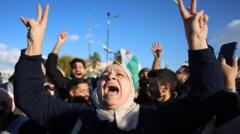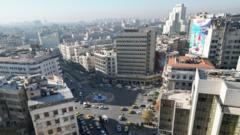Thousands of Syrians celebrated the fall of Bashar al-Assad's regime in Damascus and other cities, marking a new chapter for the nation. However, the jubilation is contrasted by the sorrow of families searching for missing loved ones, spotlighting the ongoing impact of the decade-long conflict.
Celebrations Erupt in Syria Following Assad's Ouster

Celebrations Erupt in Syria Following Assad's Ouster
Amidst the joy of liberation, the victory rallies in Syria reveal a nation poised for change while grappling with the haunting remnants of a brutal regime.
In a historic turn of events, Syria experienced a wave of joyous celebrations following the collapse of Bashar al-Assad's regime. Throngs of jubilant Syrians flooded the streets of Damascus and other cities to mark what they termed the “victory of the blessed revolution.” The atmosphere was festive, particularly at Umayyad Square, where music filled the air and crowds gathered to express their collective relief.
Islamist rebel leader Abu Mohammed al-Jolani, now known by his real name Ahmed al-Sharaa, encouraged citizens to participate in the rallies, which signified a departure from the regime's decades-long rule. The celebrations included prayer gatherings at the iconic Umayyad Mosque, followed by parades and demonstrations of unity among the Syrian opposition.
Participants across the capital waved opposition flags, chanted revolutionary slogans, and expressed their hopes for a brighter future. As university student Sara al-Zobi shared, this moment represented a freedom from oppression, heralding a new era of rebuilding the nation together. Participants such as Nour Thi al-Ghina echoed this sentiment, embracing the spirit of liberation with pride.
However, amidst this wave of optimism lies deep sorrow for many families who continue to search for missing loved ones. In stark contrast to the celebrations, some bereaved families visited a mortuary in central Damascus, hoping to identify relatives who disappeared during the regime's reign of terror. Reports from families revealed a grim reality as they compared photos of loved ones to bodies found in the morgue. Many left despondent, unable to find closure.
The horrors of Saydnaya prison, notorious for its brutal treatment of detainees, surfaced with grim reminders. Forensic experts documented the malnourished and tortured bodies transferred from the prison, exposing the atrocities committed during the Assad regime. Families, already shattered by loss, were confronted again by the stark evidence of the regime's inhumane actions.
These events underscore the dual narrative emerging in Syria—one of celebration and hope, contrasted with tragedies that continue to haunt the nation. As Syrians begin to envision a future without oppression, the specter of past anguish looms large, reminding them of the fundamental change needed to address historical injustices and build a lasting peace. This juxtaposition of joy and mourning encapsulates the complex emotional landscape of a nation heading toward an uncertain but potentially transformative future.



















